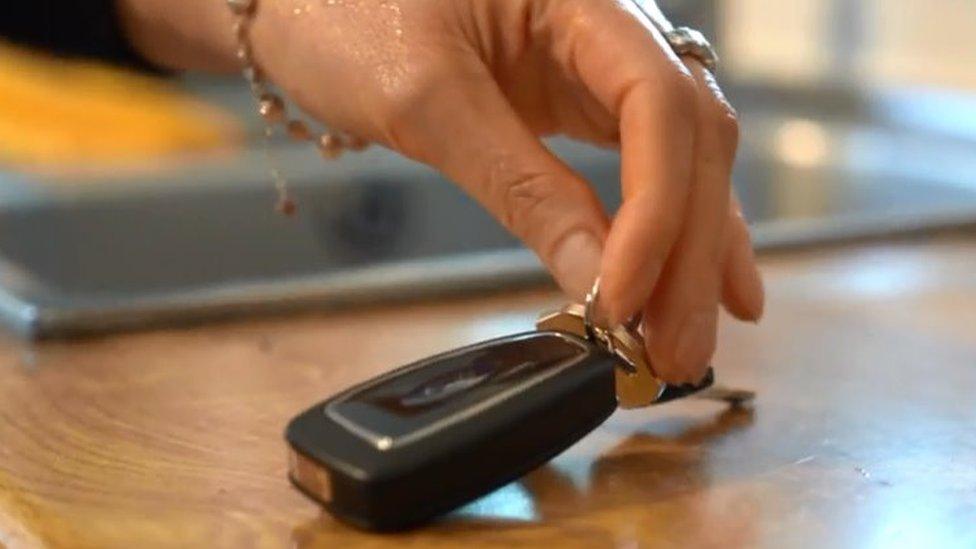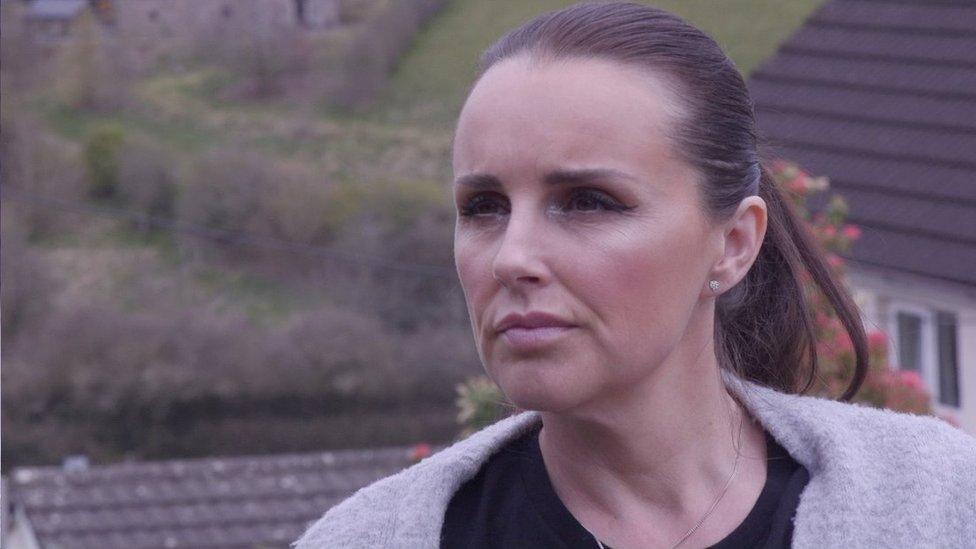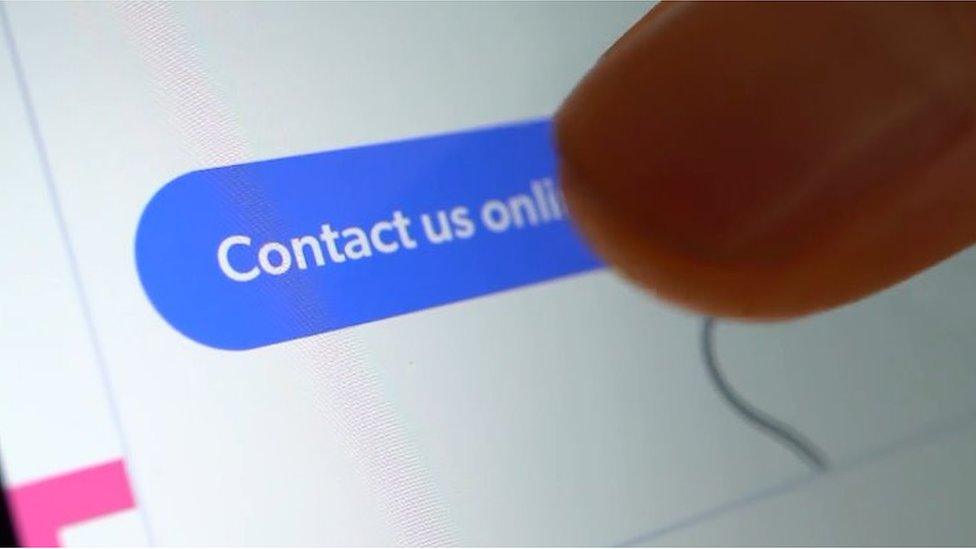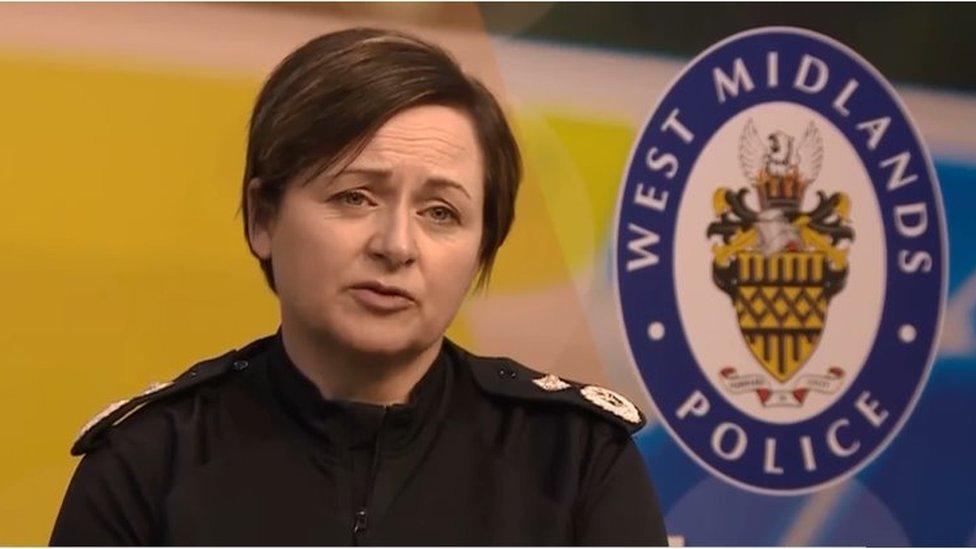Coronavirus: Domestic abuse calls up 25% since lockdown, charity says
- Published
Tara: "I didn't care if I didn't wake up from the night before"
The National Domestic Abuse helpline has seen a 25% increase in calls and online requests for help since the lockdown, the charity Refuge says.
It received hundreds more calls last week compared to two weeks earlier, the charity which runs the helpline said.
Campaigners have warned the restrictions could heighten domestic tensions and cut off escape routes.
The charity said pressure on other services and awareness campaigns could have also led to the increase.
One woman, who fled her abuser a few days ago, told the BBC life had become intolerable since the lockdown started.
'Tara', who asked the BBC not to use her real name, said she had been suffering mental and physical abuse from her partner for six months.
When the lockdown began things became markedly worse.
To start with the abuse was subtle: "Isolating me from my family and friends… thinking I'm cheating on him when I'm with him all the time… just controlling".
Her abuser deleted her social media accounts and stopped her from seeing family.
She says he was "mentally abusive, verbally and obviously hitting me… recently it's obviously been getting worse, since the lockdown."
"It's been bad… I didn't care if I didn't wake up like from the night before... I just knew what was going to happen the next day, I just wanted the days to go past."
"As soon as he gets up, he tries to cause an argument out of nothing, and if I fire back he'll just hit me."
Tara has now fled to a refuge in Wales, and is being supported by Llamau, a charity for young people and vulnerable women.
Visits to the UK-wide National Domestic Abuse helpline website for information were 150% higher than during the last week in February, Refuge said.
Another high-profile campaigner, Rachel Williams, believes domestic violence and potentially homicides will escalate as social distancing restrictions in the UK continue.

Escape routes such as the school run have been closed off by the lockdown
Many perpetrators already use isolation "as a tool of control" Sandra Horley, chief executive of Refuge said.
She said last year 1.6 million women in England and Wales experienced domestic abuse, and "while in lockdown or self-isolation, women and children are likely to be spending concentrated periods of time with perpetrators, potentially escalating the threat of domestic abuse and further restricting their freedom.
"Domestic abuse isn't always physical - it's a pattern of controlling, threatening and coercive behaviour, which can also be emotional, economic, psychological or sexual."

Domestic abuse survivor Rachel Williams believes lockdown will mean more homicides
Rachel Williams suffered at the hands of her husband for 18 years and when she told him she was leaving he shot her with a sawn-off shotgun.
"For me the homicide rate is going to go through the roof, and this is what we're anticipating and bracing ourselves for," she told the BBC.
"You can't stop the perpetrator unless he's visible.
"We'll never eradicate domestic abuse, end of, we've got an epidemic at the moment in the UK, with a pandemic on top."

The National Domestic Abuse Helpline can be contacted online as well as by phone
Police are emphasising that women and men facing abuse at home during the lockdown should still report their experiences to police and seek support from domestic abuse services.
West Midlands Deputy Chief Constable Louisa Rolfe, who leads on domestic abuse for the National Police Chiefs' Council said: "We would always seek to remove the perpetrator...
"Because often victims in their own home where family, friends and neighbours can look out for them are much safer than if we remove them."

West Midlands Police Deputy Chief Constable Louisa Rolfe leads on domestic abuse for the National Police Chiefs' Council
Refuge says the helpline is still running 24 hours, seven days a week, with staff operating from home.
One effect of being locked down with your abuser could be that not only are people more vulnerable to domestic abuse - but also possibly less likely to be able to make an emergency phone call.
The National Domestic Abuse Helpline therefore offers the option of contacting them through its website, with a quick exit button which ensures no record of the attempt is left on the phone.
For Tara, although the abuse worsened when having to spend 24 hours a day in isolation with her partner, she feels the lockdown proved to her that she needed to escape her relationship forever.

For information and support on domestic abuse, contact:
Police: 999 press 55 when prompted if you can't speak
Refuge UK wide 24-hour helpline: 0808 2000 247
Welsh Women's Aid Live Fear Free 24-hour helpline: 0808 80 10 800
Scotland National Domestic Abuse and Forced Marriages 24-hour helpline: 0800 027 1234
Northern Ireland Domestic Abuse 24-hour helpline: 0808 802 1414
Online webchats and text services are also available.